What’s Next in Personalized Nutrition?
Personalization is the next big food trend. Which products are leading the way?
Personalization is the next big food trend. Which products are leading the way?
A long time ago, food manufacturers boasted about low calories and fat, a claim that hasn’t been trendy in two decades, according to food marketing consultant Datassential. At the turn of the century, emphasis shifted to “feel good” foods that are locally-sourced or fair trade, and more recently by “functional” products that claim to make you healthier.
But get ready for the new trend: personalization, as new companies emerge to offer products that are customized to our individual genes.

Food of the future [via Pixabay]
Many of those startups presented recently at the Kisaco Research Personalized Nutrition Innovation Summit in San Francisco, which I attended to get early hints of the next generation of hot products.
Genomics-based personalized nutrition for consumers
Many of the most cutting-edge personalized diets use your genetic information to propose specific foods or supplements that match your body’s type.
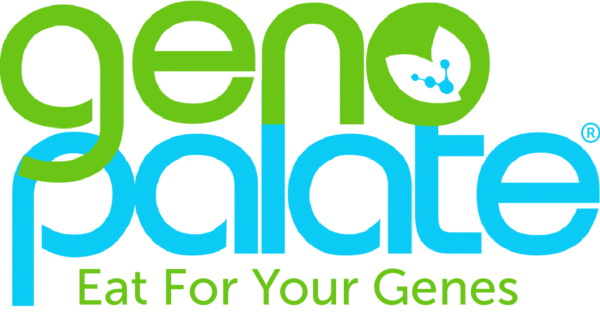
Genopalate, for example, sends you a custom report based on decades of obesity research by founder Yi Sherry Zhang. [more here] Their $189 DNA kit ($60 if you already have data from a service like 23andme) gives a “nutrigenetic score”, your personalized dietary information based on 28 nutrition-related genetic traits known to be associated with specific nutrients. With data now from thousands of customers, Genopalate can plot how people’s nutrigenetic scores vary depending on the type of food.
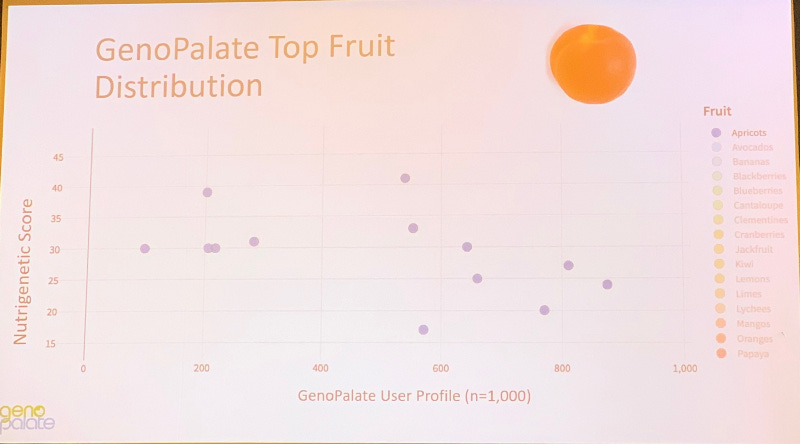
Data from 1,000 Genopalate users shows apricots appear to be good for relatively few people.
Other companies use microbiome-based tests, either by themselves or in combination with genomic and other information.
Viome is the most well-established of these, claiming more than 50,000 customers and growing by 10,000 per month for their $400 Gut Intelligence test, which uses metatranscriptomic technology to identify the functioning microbes in the gut. Instead of looking at microbes generally, their technology claims to pick out only the active genes being expressed.

Viome Chief Science Officer Momo Viyisich at the Personalized Nutrition Innovation Summit 2019.
Viome claims results from a 500-person clinical trial show they were able to correctly predict conditions like type 2 diabetes, inflammatory bowel syndrome, and even age based just on the results of their test. They’re now expanding the tests to include Food Sensitivity and, soon, a home-based blood test using the same technology.
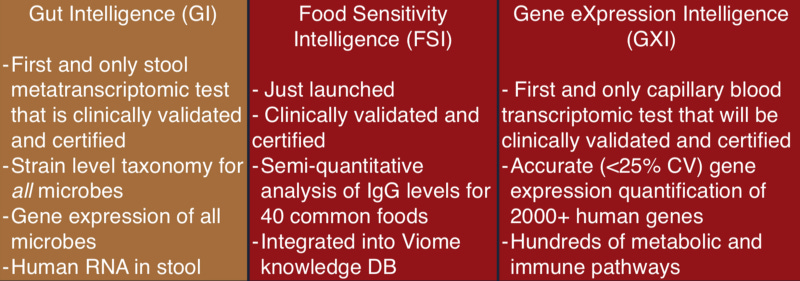

For $170/month, Digbi Health offers a six-month program that includes before/after microbiome testing (using a relabeled uBiome Explorer gut kit) as well as DNA and other tests to give personalized coaching and wellness reports wrapped into a lifestyle-tracking app. Based on the results of their early, still unpublished clinical study, Digbi recently signed an agreement with insurer Blue Shield to offer the product through physicians, with Digbi paid based on results, like compliance or specific weight loss goals.
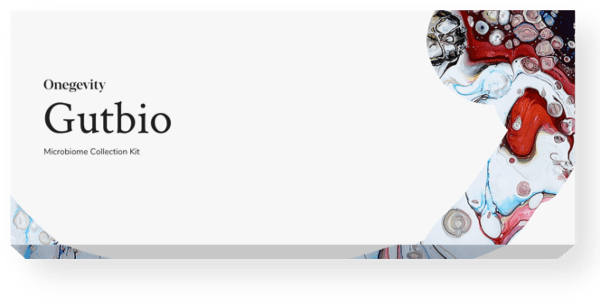
Onegevity Health, founded by well-known researchers Joel Dudley (Mount Sinai) and Chris Mason (Cornell) offers a $350 metagenomic gut microbiome test that can unlock the workings of the microbiome with far greater precision than previous products. Later this year they’ll add an at-home blood test (from Drawbridge Health) to build a “Health Intelligence Platform”.
Bigger companies are getting involved too: Vitalmins is a new line of personalized supplements from world-wide consumer products giant RB, known for brands like Clearasil or Enfamil.

Suggestic is an app maker that helps you find and stick to an ideal diet plan. You start with a questionnaire about your goals and preferences, helping you find one of several dozen built-in diet programs, including premium ones by well-known nutrition experts. The app gives day-to-day suggestions and feedback in a consistent way across the different programs, letting you try and skip until you find the plan that’s ideal for you.
For even more personalization, Suggestic offers an at-home $200 food sensitivity test. Prick your finger to send a small sample to their lab for feedback on your immune response to 96 different foods. The results help further inform your ideal diet, helping to filter among dozens of plans to the one perfect for you.
But the really cool stuff is yet to come. CEO Victor Chapela showed off “Suggestic Lens”, a new version of the iPhone app that includes Apple’s latest augmented reality (AR) technology. Using a database of menus from more than 100,000 restaurants, you can point your phone at a menu to see the items that are suggested for your specific diet.
Personalized nutrition devices and nutraceuticals
Once you uncover a dietary deficiency, a natural solution is to try a supplement and many of the personalized nutrition companies are happy to supply you with custom vitamins, often by subscription. But what if you could make your own personalized nutrition drinks right in your kitchen?
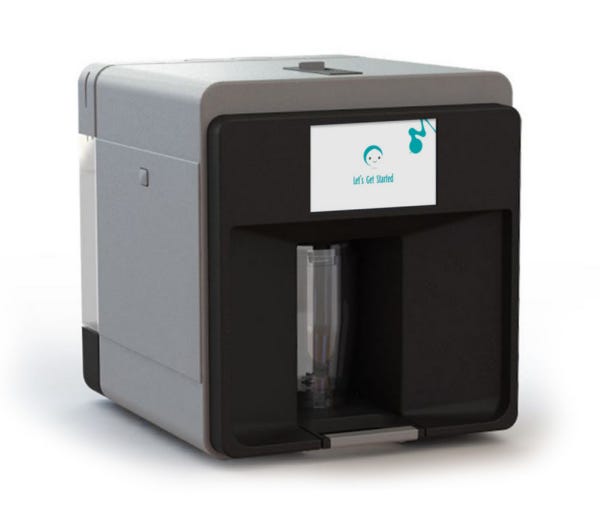
That’s the idea behind MixFit, which for $400 gives you a drink-mixing machine that will produce nutritional drinks on-the-spot with exactly blend you want. It’s like a Keurig coffee maker, only instead of coffee or tea, the accessory “pods” contain nutraceutical and flavoring blends that the machine mixes in the correct proportion for each drink. You control the proportion through an app on your phone that uses lifestyle and health information to build a drink personalized just for you. Because the app knows what you need, it can follow the timing and amount of each drink, ensuring you’ll never take too much or too little of a given nutrient.

Another countertop appliance, $99 from Detroit-based Tespo, dispenses liquid vitamins from “Vitamin Pods”, monthly packs available in more than a dozen different types, from Nature-Made-branded multivitamins, to specialized ones for better sleep or energy. CEO Ted Mills describes his business as tracking inputs versus outputs like you get from fitness trackers, etc. The WiFi-enabled Tespo appliance knows precisely what supplement dose you took and the time, so there’s no more guessing about whether you or a loved one actually took the pill.
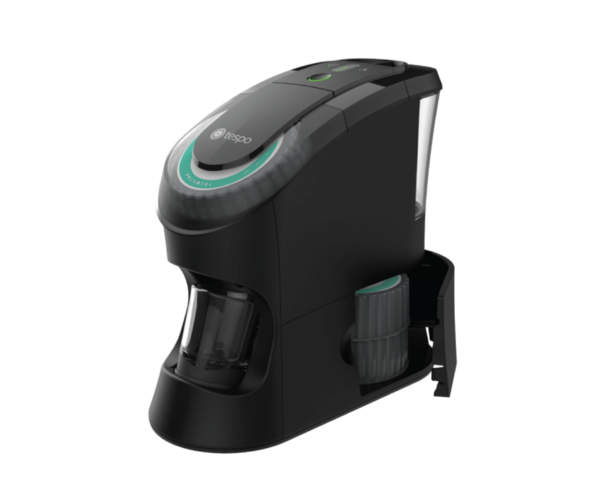
Tespo’s $99 kitchentop supplement dispenser.
Tracking compliance is one of the most difficult parts of any clinical study, so Tespo is a natural partner for researchers too. The company is conducting a sleep study this summer, where they equip participants with Fitbit sleep trackers and supplement pods for improving sleep. By tracking precisely who takes which supplement, and the time of day they take it, Tespo hopes its data will be more accurate and actionable than other sleep studies.
Personalized data and services

You may not have heard of Whisk, but I bet you’ve used their software. Whenever you visit a recipe web site and see an ad from your local grocery store selling the recipe ingredients, you’re probably seeing data from Whisk, which calls itself “the world’s smartest food platform”, and boasts a large database of recipes and their ingredients, plus an API and various plug-ins that make it possible for other companies to offer personalized food information. Samsung Next thought Whisk was so useful to their Internet of Things (IoT) planning that they acquired the company in March 2019.
Edamam offers another food API, based on a database of 700,000 items and more than 1.7M recipes, letting you quickly find the nutritional and other information about any recipe.Type a recipe into their food wizard and it will compute a nutritional breakdown, ingredient substitutions, plus tags like whether the food is vegan or gluten-free.
Access to large food databases is great for generating personalized diet information, but what if you’re building a new product that requires lab data?

ixLayer, founded by an infrastructure-savvy team formerly from Illumina, FlickR, Yahoo and other internet companies, supplies all the development pieces needed to securely build a genetic product. They’ve partnered with lab equipment giant Thermo-Fisher, which also works actively with startups trying to develop new genomics tests.
Need to manufacture a batch of custom supplements? Panaceutics makes high-volume personalized formulations, for both supplements and pharmaceutical-grade therapeutics.
The coming explosion
The above companies are just a hint at the new products that are making the world more personalized. Even products that in the past might have launched as a just another new supplement, like the glucose-lowering Reducose from Phynova, or the Black Currant from Vitality Wellness will be looking to self-experimenting personal scientists like me, who use the low cost and availability of new state-of-the-art diagnostics to see how they affect individual people. We are all outliers, and a product or formulation that works for one person may not work for another.
The future is personalized.
Originally published at https://richardsprague.com.


